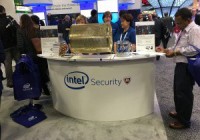Tech Rivals Unite To Support Apple In iPhone Privacy Case Vs. FBI
A who’s who of Internet and technology companies on Thursday filed legal briefs in support of Apple ( AAPL ) in its fight to keep iPhone data private. The companies expressed concern that a federal court order forcing Apple to unlock an iPhone in a criminal case could have far-reaching negative implications for the privacy and security of consumer data. The law firm of Hogan Lovells represented 15 companies, including Amazon.com ( AMZN ), Cisco Systems ( CSCO ), Facebook ( FB ), Google and Microsoft ( MSFT ), in its brief backing Apple. Munger, Tolles & Olson represented 18 Internet companies, including eBay ( EBAY ), LinkedIn ( LNKD ), Twitter ( TWTR ) and privately held Automattic in its supporting brief. The Hogan Lovells filing argues that the federal government is misusing the All Writs Act to try to force Apple to write software to bypass its own security features. It notes that the companies filing the amicus brief often compete vigorously with Apple and each other, but “here speak with one voice because of the singular importance of this case to them and their customers.” The Munger, Tolles & Olson filing hammers home similar points. “This extraordinary and unprecedented effort to compel a private company to become the government’s investigative arm not only has no legal basis under the All Writs Act or any other law, but threatens the core principles of privacy, security, and transparency that underlie the fabric of the Internet,” the law firm wrote. On Feb. 16, U.S. Magistrate Sheri Pym ordered Apple to provide “reasonable technical assistance” to the FBI to help unlock an iPhone belonging to Syed Farook, one of the killers in the San Bernardino, Calif., terrorist attack on Dec. 2. Apple has protested the ruling, saying that it would create a “back door” to bypass its security protections and thus threaten the personal data of millions of iPhone users. Once available, the vulnerability could be exploited by cybercriminals, hackers and both foreign and domestic spies. Other parties filing briefs in support of Apple in the case include AT&T ( T ), Intel ( INTC ) and trade groups like the Consumer Technology Association and Business Software Alliance. Apple also has gained the backing of privacy advocacy groups including the American Civil Liberties Union, Electronic Frontier Foundation and Electronic Privacy Information Center. Apple has posted on its public relations website a list of parties filing amicus briefs in support of its case . But the FBI has garnered its own set of supporters filing amicus briefs in the case. Parties backing the FBI’s position include the Federal Law Enforcement Officers Association, the Association of Prosecuting Attorneys, the National Sheriffs’ Association, the California State Sheriffs’ Association, California Police Chiefs’ Association, California Peace Officers’ Association and San Bernardino District Attorney Michael Ramos, as well as the families of several victims of the Dec. 2 shootings.
